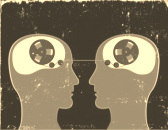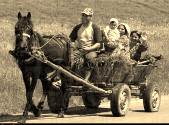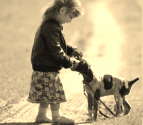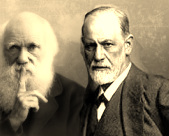Research
1. Altruism, Cooperation, Generosity
One of the key questions in evolutionary biology and psychology is why individuals help strangers without the possibility of return (Batson et a. 2003, Bowles and Gintis 2004, Gintis et al. 2003, Fehr and Rockenbach 2004). Several scholars raised the idea that during most stages of human evolution humans evolved in small groups with frequently repeated interactions and reputation-building mechanisms (Fehr and Rockenbach 2003, Johnson et al., 2003). Individual selection can favour cooperative strategies directed towards recipients that have helped others in the past. More ...
|
2. Machiavellism It has been assumed that the manipulative behavior characteristic of Machiavellianism cannot work efficiently without the refined use of the theory of mind Good mind readers – that is, people who can easily project themselves into the thoughts of others and understand their intentions, beliefs and knowledge – can use this ability more efficiently for achieving their goals than people with weaker mindreading capacity. More ...
|
3. Adult mindreading
In a study we have made an attempt to clarify the relationship between mindreading capacity and the ability and commitment for social contact (Paal and Bereczkei 2006). The basic hypothesis is that one’s achievement in theory of mind - the ability to construct mental representations of the mental states of other people – deeply influences the ways one shapes social relationships. In order to evaluate the individual differences in mindreading capacity, a series of 14 stories were read to participants, that required listeners to understand the perspective and intentions of the actors. More ...
|
4. Homogamy, Sexual Imprinting
The studies of so-called homogamy have shown that the majority of mates resemble each other in a high number of traits. We suggest that imprinting-like mechanisms, rather than “direct” genetic detection (phenotype matching) are responsible for choosing similar mates. Under the influence of family background children internalize the phenotype of their opposite-sex parent as a template for acquiring mates. More ...
|
5. Physical Attractiveness, Facial Beauty
Recently, we have achieved a research program in which certain general principles of attractiveness will be studied (Mesko 2007). First, we compose average female faces, then each facial trait on these faces is changed using a specific computer program (that means increasing or decreasing the measure of lip and jaw, enlarging or reducing the size of the eye, etc.). We are interested in the relationships among various facial features; how each of them contributes to the attractiveness judgment as a whole. More ...
|
6. Mate Choice
According to the recent evolutionary theory, males and females have been selected for different kinds of mate preferences as behavioral adaptations in our ancestral past. These psychological algorithms, on the other hand, are open to ecological/cultural changes in the contemporary societies and, as a consequence, there are permanent trade-offs between the possible behavioral outputs in mate choice. More ...
|
7. Life History Strategies
In an early study, Hungarian Gypsies were described as r-strategists compared to non-Gypsy Hungarians in terms of birth weight, fertility, mortality, etc (Bereczkei 1993). A more recent paper has revealed that the extensiveness of kinship networks and the degree of the relatives’ assistance with childcare were strongly predictive of fertility among Gypsies. More...
|
8. Parental Investment, Discriminative Childcare
Parental psychology has been shaped by selection to make adaptive decisions about the timing and amount of investment in offspring. The probability of future reproduction is expected to be higher when the resources available for a mother would have greater fitness returns if they have been consumed for the subsequent offspring, rather than for a present one. More ...
|
9. Developmental Trajectories, Socialization
An evolutionary theory of socialization suggests that individuals have been selected for a capacity to adjust life histories in response to environmental conditions, and variations in developmental patterns are considered as adaptive answers to different circumstances. Humans possess innate learning rules that guide behaviour during an early sensitive period. More...
|
10. Evolutionary Psychology and Psychoanalysis
In one of our studies we attempted to reinterpret Freud’s key-concept, the Oedipus complex, or at least a few of its elements, and reconcile it with the evidence coming from the modern empirical science (Bereczkei and Gyuris 2007). Based on the results of former researches, we argued that the original Freudian assumptions about humans’ desire to establish incestuous relationship with the mother, and in general humans’ incestuous drives, cannot be justified. More ...
|










